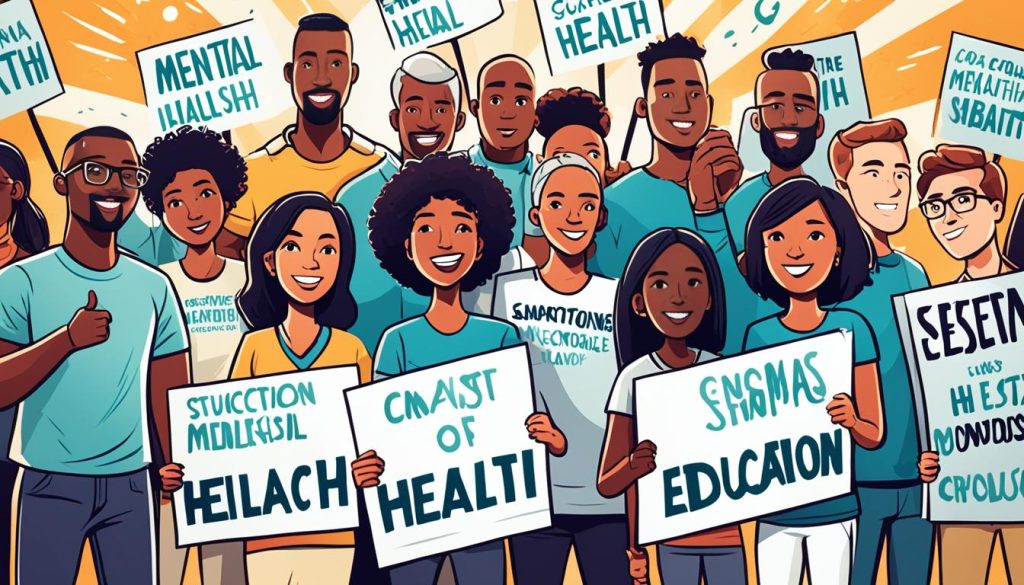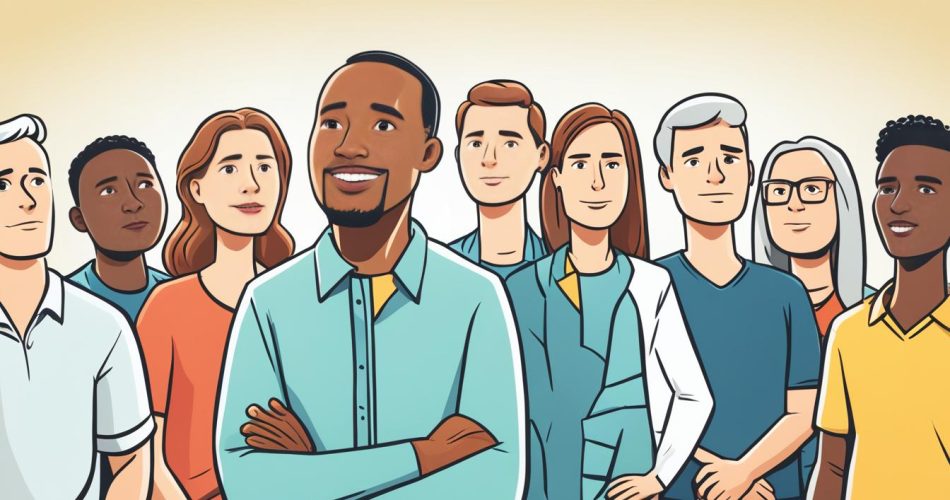As awareness about mental health continues to grow, it is important to address the stigma surrounding mental illness. Stigma can negatively impact individuals with mental health conditions, leading to discrimination, limited understanding, and reluctance to seek help. To break the stigma and promote mental health acceptance, we must challenge societal perceptions and advocate for change.
There are various strategies individuals can employ to overcome the stigma around mental health. First and foremost, seeking treatment is crucial. By addressing our mental health needs, we are actively working towards destigmatizing mental health and promoting overall well-being.
Additionally, combating self-doubt and shame is essential. Mental illness is not a personal weakness, and we should not let stigmatizing beliefs define our self-worth. Reaching out for support from trusted individuals can help create a network of understanding and empathy.
Using person-first language is another effective method of reducing mental health stigma. By separating a person’s identity from their illness, we promote respect and recognition of their individuality.
Joining support groups provides an opportunity to connect with others who understand firsthand the challenges of mental health. By sharing experiences and knowledge, we contribute to breaking down the barriers of misunderstanding and isolation.
Advocating against stigma is a powerful way to make a difference. By speaking out, raising awareness, and challenging misconceptions, we can shift societal attitudes towards mental health and promote acceptance and understanding.
Finally, seeking accommodations in educational settings is crucial for students with mental health conditions. Teachers and administrators play a pivotal role in creating inclusive environments that support students’ well-being and academic success.
By implementing these strategies and promoting mental health acceptance, we can collectively contribute to breaking the stigma surrounding mental health and creating a more compassionate society.
Key Takeaways:
- Seeking treatment is crucial for overcoming mental health stigma
- Combat self-doubt and shame, recognizing that mental illness is not a personal weakness
- Reach out for support from trusted individuals
- Use person-first language to separate a person’s identity from their illness
- Join support groups to connect with others experiencing similar challenges
The Harmful Effects of Stigma
Stigma surrounding mental health can have devastating consequences on individuals who experience it. The detrimental effects of stigma include:
- Discrimination: Stigma often leads to discriminatory behavior towards individuals with mental health conditions, resulting in prejudice, exclusion, and mistreatment.
- Reluctance to seek help: Due to the fear of being labeled or facing judgment, many individuals avoid seeking help or treatment for their mental health, which can further exacerbate their condition.
- Lack of understanding: The stigma attached to mental illness often stems from a lack of understanding, leading to misconceptions and stereotypes that can perpetuate harmful beliefs.
- Limited opportunities: Individuals facing stigma may experience limited opportunities in various aspects of life, including education, employment, social interactions, and personal growth.
- Bullying and violence: Stigmatizing attitudes contribute to bullying, harassment, and even physical violence against individuals with mental health conditions, adding to their distress and isolation.
- Inadequate insurance coverage: Mental health stigma can result in inadequate insurance coverage for mental health treatments, preventing individuals from accessing the care they need.
- Negative beliefs: Stigma can lead individuals to internalize negative beliefs about themselves, perpetuating self-judgment, low self-esteem, and feelings of worthlessness.
These harmful effects highlight the urgent need to break down the stigma surrounding mental health and create a more accepting and supportive society.
Coping Strategies for Overcoming Stigma

When faced with the stigma surrounding mental health, there are effective coping strategies that can empower individuals to navigate through these challenges. By implementing these strategies, we can break down barriers, promote understanding, and foster acceptance.
1. Get Treatment and Seek Support
One crucial step in coping with stigma is to prioritize your mental health by seeking treatment. Don’t let the fear of being labeled prevent you from getting the help you need. Remember, seeking treatment is a sign of strength, not weakness. Additionally, reaching out to trusted individuals for support can provide the emotional assistance necessary to navigate and overcome stigma.
2. Avoid Self-Doubt and Shame
It’s important to recognize that mental illness is not a personal weakness. Refrain from blaming yourself or feeling ashamed about your condition. Instead, focus on understanding that mental health conditions are medical conditions, just like any other. By reframing your perspective, you can free yourself from the burden of self-doubt and shame.
3. Use Person-First Language
Using person-first language can help separate your identity from your mental illness. Instead of saying, “I am depressed,” say, “I have depression.” By shifting the language, you reinforce the idea that mental illness does not define who you are as a person.
4. Join Support Groups
Joining support groups provides an invaluable opportunity to connect with others who understand what you’re going through. These groups offer a safe space for sharing experiences, gaining insights, and finding a sense of community. Knowing that you’re not alone can be incredibly empowering.
5. Speak Out Against Stigma
Advocacy is a powerful tool for challenging and changing societal perceptions. Speak out against stigma through various mediums, such as social media, public forums, or personal storytelling. Your voice has the potential to inspire and educate others, fostering a more compassionate and understanding society.
By reframing your perspective, you can free yourself from the burden of self-doubt and shame.
6. Empower Yourself
Empowerment is key to overcoming stigma. Choose to live an empowered life by focusing on self-care, setting boundaries, and engaging in activities that promote your well-being. Taking control of your narrative and embracing self-acceptance can help you navigate through the challenges of stigma with strength and resilience.
Remember, coping with stigma is a journey. Be patient with yourself and celebrate the progress you make along the way. By implementing these coping strategies, you can reclaim your power, break down barriers, and pave the way for a more inclusive and accepting future.
Breaking Stigma through Education and Advocacy

Education and advocacy are powerful tools in breaking the stigma surrounding mental health. By sharing personal stories and experiences, we can challenge misconceptions and promote understanding. Through conscious language use, we can avoid reinforcing stigma and instead encourage empathy and compassion.
One important aspect of breaking stigma is advocating for equality between physical and mental illnesses. By highlighting that mental health is just as important as physical health, we can foster a more inclusive and supportive society.
Open conversations and awareness campaigns also play a crucial role in breaking down societal perceptions of mental health. By encouraging open dialogue, we create spaces where individuals feel comfortable sharing their experiences and seeking support.
“Education is the most powerful weapon which you can use to change the world.” – Nelson Mandela
In addition to personal efforts, media awareness is essential in challenging stereotypes and promoting accurate portrayals of mental health. By advocating for responsible and accurate representations in media, we can greatly contribute to reducing the stigma surrounding mental health.
Breaking the stigma around mental health requires a collective effort of education, advocacy, and open-mindedness. Together, we can create a society where mental health is accepted, understood, and supported.
Personal Stories: A Powerful Tool
Sharing personal stories is a powerful way to break stigma and challenge misconceptions. When individuals bravely share their experiences with mental health, it humanizes the issue and helps others understand the realities of living with a mental illness.
Personal stories have the ability to touch hearts, ignite empathy, and inspire change. They can create a sense of connection and remind us that mental health is a shared human experience.
Conscious Language Use: Choosing Our Words Wisely
Language has the power to shape our perceptions and attitudes towards mental health. By using conscious language, we can avoid stigmatizing terms and instead foster a more compassionate and inclusive environment.
Choosing person-first language, such as saying “a person with schizophrenia” instead of “a schizophrenic,” acknowledges the individual beyond their diagnosis. It emphasizes their humanity and dignity, reducing the stigma associated with mental health conditions.
Equality and Empathy: Bridging the Gap
Breaking down the stigma surrounding mental health requires us to recognize the equality between physical and mental illnesses. Just as we wouldn’t discriminate against someone with a physical ailment, we should extend the same empathy and support to those with mental health conditions.
Encouraging empathy and understanding helps create a society that values mental well-being and provides necessary support for individuals facing mental health challenges.
Open Conversations: Building Supportive Communities
Open conversations are vital in dismantling the stigma surrounding mental health. By creating safe spaces for discussion, we can foster understanding, provide support, and encourage individuals to seek help without fear of judgment.
Supportive communities, both online and offline, play a crucial role in breaking stigma. By connecting individuals with shared experiences, support groups provide a sense of belonging and empowerment.
The Role of Media: Shaping Perceptions
The media has a significant influence on how mental health is perceived by society. By advocating for accurate and responsible portrayals, we can challenge stereotypes and promote understanding.
Media awareness entails encouraging balanced and nuanced depictions of mental health. By highlighting diverse experiences and showcasing individuals living fulfilling lives with mental illnesses, we can contribute to reducing stigma and promoting acceptance.
The Role of Support Groups and Mental Health Organizations
Support groups and mental health organizations play a crucial role in reducing stigma and promoting mental health acceptance. These organizations provide valuable resources and support for individuals with mental illness and their families, helping them navigate their journey towards better mental well-being.
One prominent organization in the field of mental health is the National Alliance on Mental Illness (NAMI). NAMI is dedicated to improving the lives of those affected by mental health conditions through advocacy, education, support, and public awareness campaigns.
Reducing Stigma and Educating the Public: Mental health organizations like NAMI actively work towards reducing stigma by challenging societal perceptions and educating the public about mental health. They aim to dispel myths, tackle discrimination, and promote understanding, thus creating a more compassionate and inclusive society.
Providing Resources and Support: These organizations offer a wide range of resources to individuals with mental illnesses and their families, providing vital information, guidance, and support networks. This includes online resources, helplines, peer support programs, and educational materials that empower individuals to take control of their mental health and well-being.
Vocational Rehabilitation Programs: In addition to support groups and mental health organizations, vocational rehabilitation programs assist individuals with mental health conditions in finding and maintaining employment. These programs provide valuable vocational training, job placement assistance, and ongoing support to help individuals reintegrate into the workforce and regain a sense of purpose.
Department of Veterans Affairs (VA): For veterans dealing with mental health challenges, the Department of Veterans Affairs (VA) offers comprehensive support programs and services. These programs address the unique mental health needs of veterans and provide specialized care, including therapy, counseling, and support groups tailored to their experiences.
“Mental health organizations and support groups work tirelessly to advocate for the rights and well-being of individuals with mental illnesses, helping to build a society where mental health is respected, understood, and supported.”
The efforts of support groups and mental health organizations are instrumental in fostering a more compassionate and accepting society. Their work empowers individuals to seek help, provides valuable resources, and promotes education and understanding on a larger scale. It is through their collective efforts that we can reduce stigma, break down barriers, and create a world where mental health is prioritized.
Addressing Stigma in Educational Settings
Addressing stigma in educational settings is crucial for the well-being and success of students with mental health conditions. Discrimination against students with mental illness is against the law, and it is the responsibility of educators at all levels to accommodate these students and create inclusive environments.
Teachers, professors, and administrators play a vital role in recognizing students’ disabilities and providing appropriate accommodations. By understanding the unique challenges faced by students with mental health conditions, educators can implement strategies that support their academic and emotional needs. This includes flexible deadlines, extended time for exams, and the availability of mental health resources on campus.
Open communication between students, parents, and educational staff is crucial in addressing stigma. It allows for the identification of individual needs and the development of personalized support plans. By fostering a collaborative and supportive learning environment, students are more likely to feel valued, empowered, and motivated to succeed.
“The impact of an inclusive environment cannot be overstated. When students feel supported and understood, they are more likely to engage in their education and achieve their full potential.”
– Dr. Maria Thompson, Professor of Psychology
Recognizing the importance of mental health in education, some schools have implemented mental health programs and initiatives to raise awareness and promote acceptance. These programs often include mental health education, anti-stigma campaigns, and support groups for students. By integrating mental health into the curriculum and promoting open conversations, schools can help reduce stigma and create a culture of compassion and understanding.
Primary, Secondary, and College Levels
Addressing stigma in education should be a priority at all levels, from primary and secondary schools to colleges and universities. The earlier we tackle stigma, the greater the impact we can have on students’ lives. By educating students from a young age about mental health and fostering inclusive environments, we can help break down stereotypes and promote empathy.
At the college level, where students face increased academic and social pressures, it is essential to provide a range of mental health services. These may include counseling centers, peer support groups, and awareness campaigns. Additionally, colleges should ensure that faculty and staff receive proper training on mental health issues and are equipped to support students effectively.
Accommodations for Students with Mental Health Conditions
| Accommodation | Description |
|---|---|
| Flexible deadlines | Allowing students to submit assignments after the original deadline, considering the impact of mental health on productivity. |
| Extended time for exams | Giving students with mental health conditions additional time to complete exams to accommodate cognitive challenges. |
| Access to mental health resources | Providing on-campus resources such as counseling services, support groups, and workshops on coping strategies. |
| Individualized support plans | Collaborating with students, parents, and mental health professionals to develop personalized plans to address specific needs. |
Conclusion
Overcoming the stigma surrounding mental health is a collective effort that requires us to take action. By seeking treatment for mental health conditions, challenging societal perceptions through education and advocacy, using person-first language, reaching out for support, and advocating for accurate portrayals of mental health, we can make a significant impact.
By promoting mental health acceptance and actively working towards changing societal perceptions, we strive towards creating a more inclusive and compassionate society. It is crucial to remember that everyone’s mental health journey is unique, and we must support one another in seeking the help and understanding we need. Together, through our advocacy, support, and determination, we can make a difference in the lives of those affected by mental health stigma.
Let us continue to break down the barriers, challenge misconceptions, and fight for a world where seeking support for mental health is not only accepted but encouraged. Through our collective efforts, we have the power to change the narrative surrounding mental health and create a society that promotes understanding, compassion, and support for all.
FAQ
How can I overcome the stigma surrounding mental health?
To overcome the stigma surrounding mental health, you can seek treatment, combat self-doubt and shame, reach out for support, use person-first language, join support groups, advocate against stigma, and seek accommodations in educational settings.
What are the harmful effects of stigma?
Stigma can have detrimental effects, including reluctance to seek help, lack of understanding from others, limited opportunities for work and social activities, bullying or harassment, inadequate insurance coverage, negative beliefs about oneself, and self-judgment.
How can I cope with and overcome stigma?
Coping strategies include seeking treatment without fear of being labeled, avoiding self-doubt and shame by recognizing mental illness is not a personal weakness, reaching out to trusted individuals for support, using person-first language, joining support groups, speaking out against stigma, and empowering oneself.
How can education and advocacy help break the stigma?
Education and advocacy play a crucial role in breaking the stigma around mental health. Sharing personal stories, challenging misconceptions, using conscious language, encouraging equality between physical and mental illnesses, having open conversations, raising awareness through media, and advocating for accurate portrayals of mental health can all help reduce stigma.
What is the role of support groups and mental health organizations?
Support groups and mental health organizations like the National Alliance on Mental Illness (NAMI) provide resources and support for individuals with mental illness and their families. They also focus on educating the public, challenging societal perceptions, and advocating for the rights of individuals with mental health conditions. Additionally, state and federal programs like vocational rehabilitation and the Department of Veterans Affairs (VA) offer support specifically for individuals with mental illness.
How can stigma be addressed in educational settings?
Addressing stigma in educational settings is crucial. Discrimination against students with mental illness is against the law, and educators should provide accommodations and create inclusive environments. Teachers, professors, and administrators play a vital role in recognizing students’ disabilities and fostering open communication with students and parents to address stigma and promote a supportive learning environment.
What can we do to promote mental health acceptance and overcome stigma?
By seeking treatment, challenging societal perceptions, using person-first language, reaching out for support, advocating against stigma, and promoting accurate portrayals of mental health, we can collectively promote mental health acceptance and overcome stigma. Together, we can create a more inclusive and compassionate society for all individuals affected by mental health stigma.

